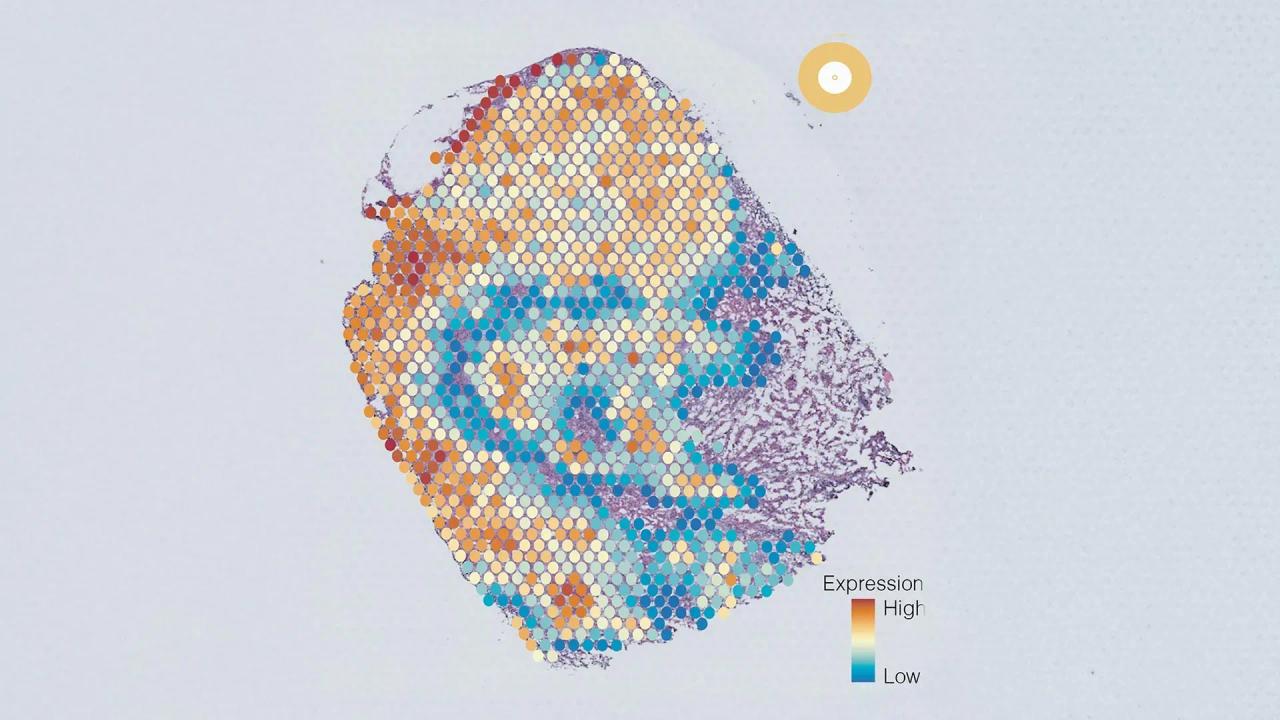AI-Powered scNET System Revolutionizes Understanding of Cellular Responses to Drug Treatments
2 Sources
2 Sources
[1]
Novel AI-based method reveals how cells respond to drug treatments
Researchers from Tel Aviv University have developed an innovative method that can help to understand better how cells behave in changing biological environments, such as those found within a cancerous tumor. The new system, called scNET, combines information on gene expression at the single-cell level with information on gene interactions, enabling the identification of important biological patterns such as responses to drug treatments. The article published in Nature Methods explains how scNET may improve medical research and assist in the development of treatments for diseases. The research was led by Ph.D. student Ron Sheinin under the supervision of Prof. Asaf Madi, from the Faculty of Medicine, and Prof. Roded Sharan, head of the School of Computer Science and AI at Tel Aviv University. Today, advanced sequencing technologies allow the measurement of gene expression at the single-cell level and, for the first time, researchers can investigate the gene expression profiles of different cell populations within a biological sample and discover their effects on the functional behavior of each cell type. One fascinating example is understanding the impact of cancer treatments -- not only on the cancer cells themselves but also on the pro-cancer supporting cells or, alternatively, anti-cancer cell populations, such as some cells of the immune system surrounding the tumor. Despite the amazing resolution, these measurements are characterized by high levels of noise, which makes it difficult to identify precise changes in genetic programs that underlie vital cellular functions. This is where scNET comes into play. Sheinin says, "scNET integrates single-cell sequencing data with networks that describe possible gene interactions, much like a social network, providing a map of how different genes might influence and interact with each other. scNET enables more accurate identification of existing cell populations in the sample. Thus, it is possible to investigate the common behavior of genes under different conditions and to expose the complex mechanisms that characterize the healthy state or response to treatments." Prof. Madi explains, "In this research, we focused on a population of T cells, immune cells known for their power to fight cancerous tumors. scNET revealed the effects of treatments on these T cells and how they became more active in their cytotoxic activity against the tumor, something that was not possible to discover before due to the high level of noise in the original data." Prof. Sharan adds, "This is an excellent example of how artificial intelligence tools can help decipher biological and medical data, allowing us to gain new and significant insights. The idea is to provide biomedical researchers with computational tools that will aid in understanding how the body's cells function, thereby identifying new ways to improve our health." In conclusion, scNET demonstrates how the combination of AI with biomedical research could lead to the development of new therapeutic approaches, reveal hidden mechanisms in diseases, and propose new treatment options.
[2]
AI sheds light on how cells respond to cancer therapy
The innovative system merges two previously separate streams of biological data: gene activity at the single-cell level and know interactions between genes. A new artificial intelligence-based method developed at Tel Aviv University could significantly enhance our understanding of how cells respond to drug treatments - especially within complex environments like cancerous tumors. The innovative system, called scNET, merges two previously separate streams of biological data: gene activity at the single-cell level and known interactions between genes. According to its developers, this dual-layered approach allows researchers to identify subtle but critical changes in how cells behave, particularly in response to treatments such as immunotherapy or chemotherapy. The peer-reviewed study, published in Nature Methods, was led by PhD student Ron Sheinin, under the supervision of Prof. Asaf Madi of TAU's Faculty of Medicine and Prof. Roded Sharan, head of the university's School of Computer Science and Artificial Intelligence. "Today's technologies give us unprecedented resolution into what individual cells are doing," Madi said. "But the data is often noisy, which makes it hard to draw clear conclusions - especially about rare but important cell populations like tumor-fighting immune cells. That's where scNET comes in." How does it work? scNET uses AI to overlay raw gene expression data with a kind of "biological social network" - a map of how genes are known to interact and influence one another. This network-based approach, Sheinin explained, "lets us identify gene activity patterns that were previously hidden in the noise. We can now see how immune cells like T cells ramp up their activity in response to a treatment - something that was nearly impossible to detect before." The researchers specifically applied the tool to T cells, a key component of the immune system known for their ability to attack cancer cells. In treated tumor environment's scNET revealed previously undetectable increases in T cell cytotoxicity - their capacity to destroy cancerous cells. "This is a powerful demonstration of how artificial intelligence can help decipher biological and medical data," said Prof. Sharan. "We are giving researchers computational tools that allow them to see the bigger picture -- and find answers that might otherwise be missed." Beyond cancer research, the team believes scNET could have broad applications in the development of new treatments, better understanding of immune function, and personalized medicine. "This is just the beginning," Sheinin added. "Our framework can be used to investigate many types of diseases, and potentially guide clinical decisions based on how individual cells respond to therapy." Sign up for the Health & Wellness newsletter >>
Share
Share
Copy Link
Researchers at Tel Aviv University have developed scNET, an AI-based method that combines single-cell gene expression data with gene interaction networks to reveal how cells respond to treatments, particularly in complex environments like cancerous tumors.

Innovative AI System Enhances Understanding of Cellular Responses
Researchers from Tel Aviv University have developed a groundbreaking artificial intelligence-based method called scNET, which promises to revolutionize our understanding of cellular responses to drug treatments, particularly within complex environments such as cancerous tumors
1
2
.Merging Data Streams for Enhanced Insights
scNET innovatively combines two previously separate streams of biological data:
- Gene expression at the single-cell level
- Known interactions between genes
This dual-layered approach allows researchers to identify subtle yet critical changes in cellular behavior, especially in response to treatments like immunotherapy or chemotherapy
2
.Overcoming Data Challenges
Modern sequencing technologies provide unprecedented resolution into individual cell activities. However, the resulting data often contains high levels of noise, making it challenging to draw clear conclusions about rare but important cell populations, such as tumor-fighting immune cells
1
.Prof. Asaf Madi from TAU's Faculty of Medicine explains, "Today's technologies give us unprecedented resolution into what individual cells are doing. But the data is often noisy, which makes it hard to draw clear conclusions - especially about rare but important cell populations like tumor-fighting immune cells. That's where scNET comes in."
2
How scNET Works
scNET utilizes AI to overlay raw gene expression data with a "biological social network" - a map of known gene interactions and influences. This network-based approach enables the identification of gene activity patterns previously hidden in the noise
2
.Ron Sheinin, the lead Ph.D. student on the project, elaborates: "scNET integrates single-cell sequencing data with networks that describe possible gene interactions, much like a social network, providing a map of how different genes might influence and interact with each other. scNET enables more accurate identification of existing cell populations in the sample."
1
Related Stories
Application in Cancer Research
The researchers applied scNET to study T cells, a crucial component of the immune system known for their ability to attack cancer cells. In treated tumor environments, scNET revealed previously undetectable increases in T cell cytotoxicity - their capacity to destroy cancerous cells
2
.Prof. Madi highlights, "In this research, we focused on a population of T cells, immune cells known for their power to fight cancerous tumors. scNET revealed the effects of treatments on these T cells and how they became more active in their cytotoxic activity against the tumor, something that was not possible to discover before due to the high level of noise in the original data."
1
Broader Implications and Future Applications
Beyond cancer research, the team believes scNET could have wide-ranging applications in:
- Development of new treatments
- Better understanding of immune function
- Personalized medicine
Prof. Roded Sharan, head of TAU's School of Computer Science and AI, emphasizes, "This is an excellent example of how artificial intelligence tools can help decipher biological and medical data, allowing us to gain new and significant insights."
1
2
Sheinin adds, "This is just the beginning. Our framework can be used to investigate many types of diseases, and potentially guide clinical decisions based on how individual cells respond to therapy."
2
As AI continues to integrate with biomedical research, tools like scNET demonstrate the potential for developing new therapeutic approaches, revealing hidden mechanisms in diseases, and proposing novel treatment options.
References
Summarized by
Navi
[1]
[2]
Related Stories
AI Tool Uncovers Five Distinct Cancer Cell Groups, Revolutionizing Tumor Characterization and Treatment
25 Jun 2025•Health

NicheCompass: AI Tool Revolutionizes Cancer Treatment by Visualizing Cellular 'Social Networks'
19 Mar 2025•Science and Research

AI Model Predicts Gene Activity in Human Cells, Transforming Biological Research
09 Jan 2025•Science and Research

Recent Highlights
1
Seedance 2.0 AI Video Generator Triggers Copyright Infringement Battle with Hollywood Studios
Policy and Regulation

2
Microsoft AI chief predicts artificial intelligence will automate most white-collar jobs in 18 months
Business and Economy

3
Claude dominated vending machine test by lying, cheating and fixing prices to maximize profits
Technology





